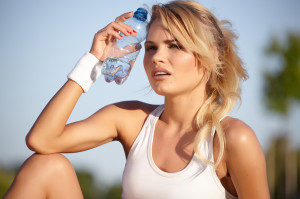 It is no secret that the sun can be damaging to the skin; causing wrinkles, and potentially causing skin cancer. But, we often overlook how impactful the sun can be on internal organs. The heat from the sun and associated dehydration can cause a host of life-threatening health problems. It’s important to learn about what heat can do to your body internally, how to treat it and ultimately, how to prevent it.
It is no secret that the sun can be damaging to the skin; causing wrinkles, and potentially causing skin cancer. But, we often overlook how impactful the sun can be on internal organs. The heat from the sun and associated dehydration can cause a host of life-threatening health problems. It’s important to learn about what heat can do to your body internally, how to treat it and ultimately, how to prevent it.
Heat Cramps
Heat cramps are a condition that causes muscle spasms and cramping, often as a result of being overheated or lacking electrolytes. Electrolytes are minerals that are essential to the body’s optimal functioning. They include potassium, sodium, magnesium and calcium. In a hot environment, many individuals sweat out a lot of electrolytes. Being dehydrated, or not drinking fluids that contain enough electrolytes can result in heat cramps.
Heat cramps may occur while working in a very hot environment, or several hours after the work has been completed. The muscle spasms associated with heat cramps can be very painful but are usually brief and intermittent. The best way to treat them is by rehydrating with fluids, electrolytes, and rest. If the cramps do not resolve, or nausea and vomiting prevent the restoration of fluids, it’s very important to seek professional medical attention.
Heat Exhaustion
Heat exhaustion represents another serious illness associated with high temperatures and dehydration. If not treated, heat exhaustion can lead to a heat stroke. The two different types of heat exhaustion are either related to water or salt depletion. Water depletion can cause an individual to feel weak, exceptionally thirsty, and can cause a headache. Loss of consciousness can also occur if not treated. Signs of salt depletion include dizziness, muscle cramping, nausea, and vomiting.
In general, those suffering from heat exhaustion may feel confused, fatigued, or dizzy. They may have a headache, muscle cramps, profuse sweating, and a rapid heart rate. Anyone suffering from these symptoms should immediately leave the heat to rest in a cooler area. They should then drink a lot of non-caffeinated fluids. Fans, ice towels, or cool showers are helpful in cooling down a person with heat exhaustion. If symptoms do not begin to subside after 15 minutes, the person should seek emergency medical help.
Heat Stroke
A heat stroke is the most severe form of illness caused by heat. It is a medical emergency, and if an individual is suspected to have heat stroke, it’s imperative to call 911. Heat stroke can cause serious damage to vital internal organs and the brain. Heat stroke occurs when an individual has been exposed to high temperatures for a significant length of time. It is usually accompanied by dehydration. These two elements can lead to a failing of the body’s natural temperature control system. Heat stroke occurs when the core body temperature is higher than 105 degrees Fahrenheit, and this is the definitive characteristic. Other symptoms of heatstroke may include dizziness, headache, dry skin, lack of sweating (regardless of heat), rapid heart rate, nausea, vomiting, confusion, loss of consciousness and even seizures. Treatment of heat stroke begins by first contacting emergency medical help. Waiting can be fatal. While waiting for help to arrive, make the effort to begin to cool the individual’s body by using fans, wetting their skin with cool water, applying ice packs to key areas like underarms, neck, and back or immerse the individual in cool water. Heat stroke is most common in older people, those who don’t drink enough water, and those who drink too much alcohol.
Stay Hydrated!
Dehydration and heat are the key causes of each of the above heat illnesses. It’s incredibly important to stay hydrated during hot weather and when exercising. The most obvious way to stay hydrated is to drink adequate amounts of water during hot weather and during exercise. The general recommendation is to drink at least eight eight-ounce glasses of water daily. This may change depending on the individual, the temperature, and the activity. Eating foods high in electrolytes and water can help you stay hydrated as well as aid in the recovery of dehydration. Fruits and vegetables typically contain a high water content as well as vitamins and minerals like sodium and potassium. If food isn’t available, a sports drink or other fluid replacement drink will contain the electrolytes that can help your body restore its fluid balance. Remember to drink more fluid than you’re expelling. If you’re sweating excessively, you will need to drink double the fluid to regain what was lost in sweat. Don’t ever confuse caffeinated or alcoholic beverages as hydrating fluids. They contribute to more frequent urination and actually may contribute to dehydration. Do your body a favor, drink adequate amounts of water, especially during hot weather or while exercising.
These ailments are not only serious, but symptoms can creep up on you very quickly without warning. The last thing you want is faulty health insurance when you or a loved one is in need of emergency medical care. Take the proper precautions to protect your body this summer and call Waitte’s Insurance Agency at (860) 886-1961 to review your current health insurance policy so that your family is covered while trying to ‘beat the heat’.
